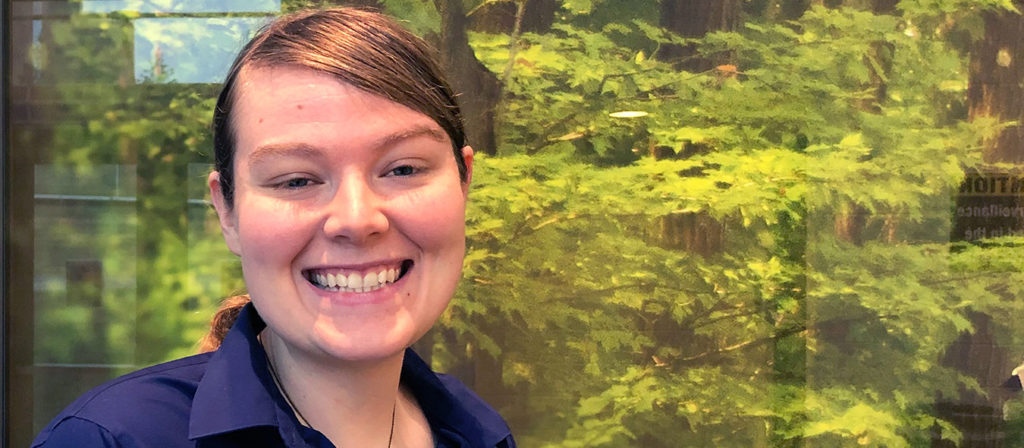West Virginia University graduate student Alice Morgan is on a mission to get kids excited about science and the outdoors.
One of 10 recipients of a prestigious fellowship from the Community for Advancing Discovery Research in Education, she will spend the next year researching the impacts of adventure STEM curriculum on sixth graders who attend WVU’s Science Adventure School at the Summit Bechtel Reserve near Beckley.
Supported by the National Science Foundation, the program provides unique capacity-building and networking opportunities for researchers who are in the early stages of their STEM education careers. Morgan is the first WVU student to receive the fellowship.
A native of Sylvania, Georgia, she discovered a passion for outdoor education as an undergraduate student at Berry College, a small, liberal arts school in her home state.
“I came in as art major, but I knew pretty quickly that wasn’t for me,” she said. “On a whim, I signed up for a one-credit high ropes course class designed for freshman. It was such a hard, challenging experience, but when I completed the weekend course, I felt like a different person. I knew I wanted more and I wanted to give more people my experience.”
That’s when she decided on a career in outdoor education and proceeded to create a major that fit her needs.
“Berry didn’t have an outdoors major – and I didn’t want to leave – so I put together an interdisciplinary studies degree in outdoor leadership that combined environmental science, psychology and the few outdoor education classes offered at the time,” she explained.
Being an outdoor educator didn’t come naturally to Morgan; it happened with a lot of dedication and practice.
“I was a couch potato kid whose family didn’t do much outdoor stuff and I had zero outdoor abilities,” she said. “I was also very anxious about speaking in front of people, so sometimes I’d go out to the ropes course when no one was around and practice with imaginary participants. All that to illustrate that my experience was so powerful it was the beginning of a personality evolution.”
Now a recreation, parks and tourism resources doctoral student in the Davis College of Agriculture, Natural Resources and Design, Morgan hopes to ignite those same feelings in West Virginia youth.
“My research shows students in West Virginia have very low interest levels in science and STEM subjects,” she said. “However, STEM teaches curiosity, problem solving and rigorously investigating ideas before you decide what you think about them.”
Kids, Morgan said, are innately curious and drawn to the concept of the outdoors. That makes combining STEM and the outdoors a winning recipe.
“The outdoors holds a little bit of magic, so taking something like archery or looking at macroinvertebrates in ponds and explaining the science behind them indulges that curiosity and sparks the desire to question how other things work,” she said. “Kids have a tendency to think science in the classroom is boring, but ziplining isn’t. If you can get them to associate the idea of science and math with an activity that is fun, exciting and interesting, they’ll carry that association back to the classroom.”
As a graduate research assistant for the Science Adventure School, an adventure-based, outdoor science school dedicated to empowering and educating West Virginia’s youth, Morgan will analyze the results of pre- and post-survey results from students who attended the four-day, three-night camp at the beginning of sixth-grade.
“We have an incredible, world-class facility in the Summit Bechtel Reserve where we have the privilege to challenge, excite and help grow the young leaders of tomorrow,” said Ali Jeney, director of the school. “Alice’s work in determining the impacts of Science Adventure School is an important part of our journey to serve all sixth graders in West Virginia.”
Morgan will look for changes in self-efficacy, interest in and value of STEM, interest in STEM careers and science identity.
Although she hasn’t formally started analyzing her data, she has noticed several trends during interviews.
“It does seem that Science Adventure School is having a positive effect on the students. Students report feeling differently about science now – it’s fun or more expansive than they thought; it’s useful outside of school, and it’s important for people to know about even if they aren’t scientist,” Morgan said. “They also thought it was easier to learn science because they got to actively do the principles they were learning about.”
And, that’s music to Jeney’s ears.
“It’s essential for folks to understand the importance of Alice’s work,” she said. “Over the course of the week at Science Adventure School, you can literally see the changes happening within students. You see their engagement increase, their comfort within their communities increase, and their confidence while learning and socializing increase. Our staff always end the week with tears in their eyes because of the ways they see some of their most challenged students rise to be their best. We know this program makes a difference, but it’s Alice’s work that’s going to help us validate those notions and share it with the world.”
Originally from Lindsay Willey for WVU Today
